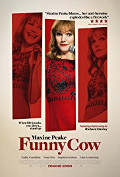
Directed by
Adrian Shergold
102 minutes
Rated MA
Reviewed by
Bernard Hemingway

Funny Cow
Synopsis: A comedian (Maxine Peake) uses her troubled past as material for her stand-up routine on the Northern England's working men's club circuit during the1970s.
Adrian Shergold’s film belongs to the well-established tradition of British social realist film stretching from Tony Richardson’s A Taste of Honey (1961) and Ken Loach’s Poor Cow (1967) through to the present day with Mike Leigh’s Vera Drake (2004) and Loach’s I, Daniel Blake (2016) with their stories set in England’s drab post-industrial North..
Not that Shergold sticks entirely to the realist style. There is the magic realist touch that quotes from Albert Lamorisse’s 1953 short film Le Ballon Rouge in which Funny Cow (this is the only name the character ever gets) meets her younger self (played with gumption by Macy Shackleton) and a similarly styled appearance by singer-songwriter Richard Hawley (who wrote the film’s songs) with Corinne Bailey Rae who duet on a lushly romantic ballad that never would have seen the light of day in early 1970s Lancashire. There is also an atypical interlude in the form of the decent man (Paddy Considine) Funny Cow meets and for a while co-habits with owns a huge bookshop that looks like a library and never has any customers. One might suppose that he lives off inherited money (he also lives in a plush art-filled house with a garden) and doesn’t care about money but once again it hardly suggests 1970s Lancashire.
These irregularities are not necessarily bad things as they leaven the grimness that is typical of the style and which are here in abundance: Alun Armstrong’s desperate circuit comedian, Funny Cow’s abusive husband (Tony Pitts, also the film’s writer) and her alcoholic mother (Lindsey Coulson) and the overwhelming sense of damply grey hopelessness bleeding into verbal and physical abuse.
But what really lifts the film out of already-seen-that familiarity is Funny Cow herself as one of those rare creatures who are born with a spark of difference and, more importantly, the strength to preserve it in the face of indifferent and in Funny Cow’s case, downright hostile circumstances. This, however, is no Educating Rita (1984) with its feel-good story of self-improvement. Funny Cow is a hard case, pandering to the racist, homophobic tastes of her larger-soaked audience and driven more by the necessity to escape her lot at any price than by any rose-tinted notion of a better life. In this respect of course, in her own way, the product of her environment. Maxine Peake’s performance is compelling, completely lacking in sentimentality but nevertheless earning our respect for her character.
What is a little odd about the film is that while alluding to the success of Funny Cow’s career, in its latter stage she seems have morphed her act into a one-woman cabaret show, something which (for a third time) seems a little unlikely for 1970s Lancashire. A little more sign-posting of its unfolding might have been a good thing. Also in what one could only describe as a strange decision on the part of the film-makers, the same actor (Stephen Graham) plays both Funny Cow’s abusive father and her grown hen-pecked brother (and the scene in which the latter appears could have been safely omitted)
Although grim in places Funny Cow feels truthful and the familiarity of the material is offset by some unorthodox, even if not entirely convincing, stylistic elements and a forceful central performance.

Want more about this film?


Want something different?




